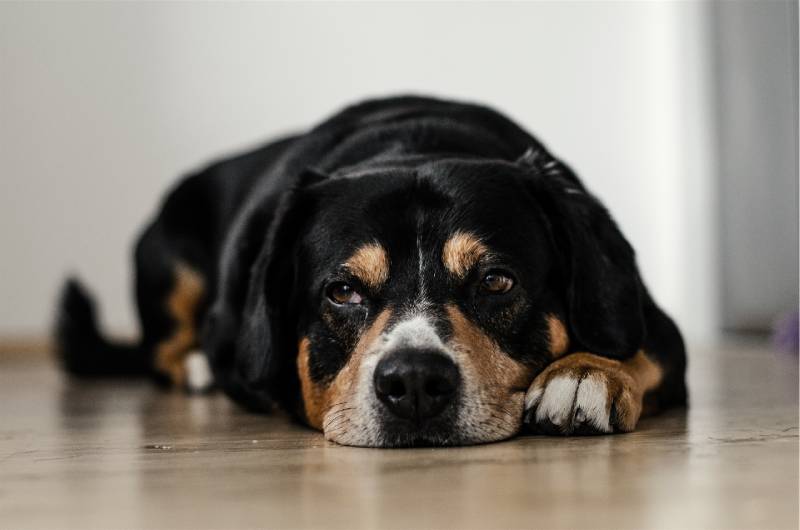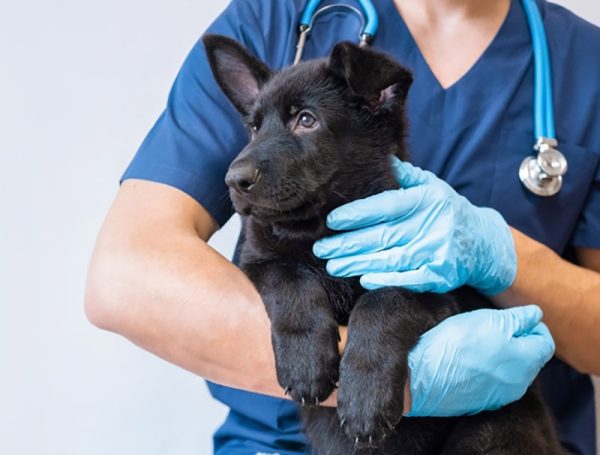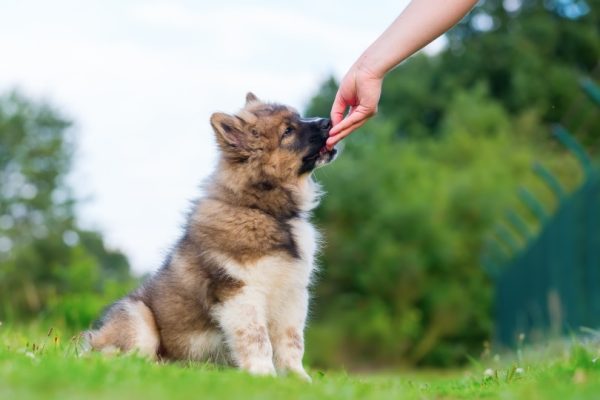In this article
There are so many reasons that owning a dog is one of the most fulfilling relationships that you can have. But with the good comes the bad, and part of this friendship comes with vomit. Cleaning up the vomit or some foamy liquid is not exactly our idea of a good time.
But why do some dogs seem to throw up more frequently in the mornings? Here, we discuss this question and when you should take your pup to the vet, along with advice on ways that you can help your dog.

Cleaning The Mess
A good cleaner helps you quickly clean up messes, especially when you come across vomit in the morning. This allows you to focus on more important things, like your pet’s health.
No matter how hard you try, pets will always leave you cleaning up smells, stains, vomit, hair, and everything in between. With the Hepper Advanced Bio-Enzyme Pet Stain & Odor Eliminator Spray, you can advance your clean-up routine!
- ADVANCED ENZYMATIC CLEANER - Penetrates the most stubborn smells and stains at the deepest molecular...
- FOR ANY MESS, ON ANY SURFACE - This pet odor eliminator cleans your carpets, floors, furniture,...
- FRESH, NATURAL ODOR - Our unique formulation doesn't rely on dangerous or unpleasant chemical...
It permanently removes the very worst pet stains and smells (and truly makes clean-up a breeze). Click here to learn more, order a bottle, and freshen up your home today.
At Dogster, we’ve admired Hepper for many years, and decided to take a controlling ownership interest so that we could benefit from the outstanding products of this cool pet company!

The 10 Potential Causes for a Dog to Throw Up in the Morning
1. Empty Stomach
This is probably the most common reason dogs throw up in the morning. It’s known as bilious vomiting syndrome, which is when dogs vomit foam and bile, usually in the early morning, but otherwise seem fine. When they go for too long on an empty stomach, intestinal and stomach reflux can occur, which leads to the dog vomiting bile.
Bile is made by the dog’s liver and stored in the gallbladder. When food passes through, the bile enters the small intestine and aids in the digestion of the food.
So, when your dog throws up a yellowish-green substance, this is the bile that abnormally enters the stomach. The longer that the stomach is empty and inactive, the more the bile reflux is triggered, and more acids build up irritating the stomach lining.
The solution is to feed your dog at regular intervals twice a day so they don’t go for so long without food. This solution should work most of the time, but there could be other health issues, so if this doesn’t work, you should take your dog to the vet.

2. Foreign Body
If a dog ingests something inedible, it can cause stomach irritation, which can lead to vomiting, particularly when the stomach is empty. Sometimes, the dog can eventually throw up the object, but the vet often needs to check what’s going on inside the dog with X-rays or an ultrasound.
The object can often be removed through endoscopy or, in a worst-case scenario, surgery.
3. Eating Food Too Fast
When dogs eat food too fast, especially on an empty stomach, they can vomit it back up again. When dogs eat too quickly, they will also gulp down air with the food, which can potentially lead to gastric torsion, otherwise known as bloat, which is a life-threatening condition.
There are a few reasons that dogs gulp their food down, some of which might be medically related. It might be a good idea to have your vet run a few tests to be on the safe side.
If your dog is gulping down food because of competition with other pets, try to feed everyone separately. You can also try feeding your pup small, frequent meals. There are also slow feeder bowls that make it more challenging for a dog to eat quickly.
Speak to your veterinarian so you can rule out any health conditions and get advice on what approach might best help your dog.
If you need to speak with a vet but can't get to one, head over to PangoVet. It's our online service where you can talk to a vet online and get the advice you need for your pet — all at an affordable price!
4. Grass
If your dog vomits shortly after going outside and eating grass, it’s quite common. It’s the grass itself that causes the vomiting, and it’s normal dog behavior for the most part.
The biggest risk to your dog is intoxication from chemical products used to treat the garden. Familiarize yourself with the other intoxication signs and bring your dog to the vet if it’s something that you’re concerned about.
- Drooling
- Vomiting
- Diarrhea
- Eye tearing
- Urination (sometimes abnormal color)
- Lethargy
- Difficulty breathing (due to bronchoconstriction)
- Abnormal heart rates
- Collapse
- Tremors
- Seizures
- Death
If your dog is a regular grass eater it’s a good idea to provide a safe garden. You should also make sure your dog is up to date on their vaccinations and deworming schedule.
5. Exercising After Eating
If your dog has eaten a big breakfast and then goes out for strenuous exercise, this might lead to a vomiting session. Just like people can become ill when exercising after eating, the same goes for dogs.
The best solution is to give your dog a small meal or treat before going out for a walk or at least make the walk more of a slow and steady activity.
6. Health Conditions
Certain health conditions in dogs can lead to vomiting signs. One of these is pancreatitis, which is the inflammation of the pancreas. Some breeds tend to be more predisposed to this condition than others. Other signs include lethargy, lack of appetite, and abdominal pain.
Inflammatory bowel disease, as well as food allergies and sensitivities, can cause a dog to vomit in the morning. Other signs include weight loss, abdominal pain, fatigue, flatulence, and diarrhea.
One of the primary signs of megaesophagus is vomiting. Other signs include weight loss, excessive drooling, coughing, bad breath, and noisy breathing.
7. Intestinal Parasites
There are many internal parasites that can cause vomiting, although the main sign is usually diarrhea. Giardia is a tiny, microscopic parasite that lives in a dog’s intestines. Beyond throwing up, symptoms include diarrhea, frequent urges to poop, lethargy, lack of appetite, and smelly flatulence.
Another microscopic parasite is coccidiosis, which lives in a dog’s GI tract. It has the same signs as giardia, but if left untreated, it can lead to death.
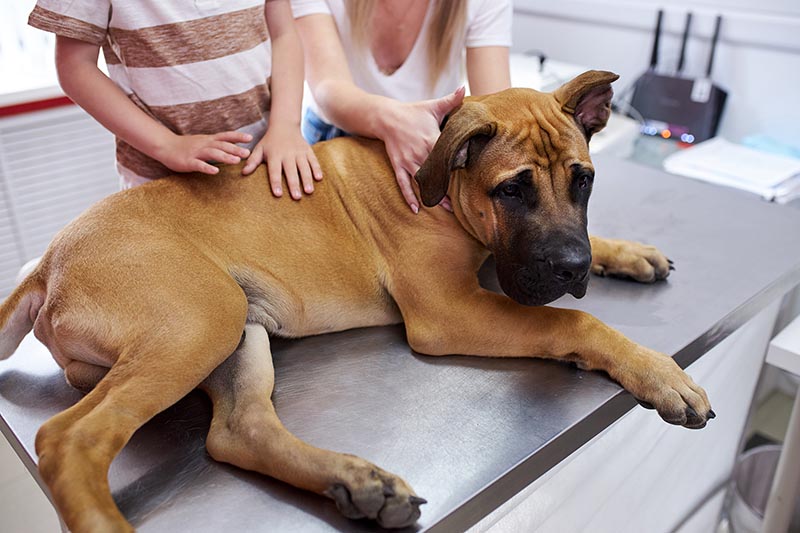
8. Food Poisoning
Sometimes, dogs eat things that they shouldn’t and can experience food poisoning, which can involve vomiting. Whether your pup got into the garbage, snatched something from the counter, or ate a plant, any one of these items might make your dog vomit or have diarrhea, lack of appetite, dehydration, and lethargy.
Drinking contaminated water can also cause vomiting and possibly death.
9. Viral Infections
Certain viruses include vomiting as one of the signs. One of the worst is parvovirus, which is highly contagious among dogs and has signs of lethargy, lack of appetite, fever, vomiting, and diarrhea.
As long as you keep your dog updated with vaccinations, though, they should be safe from catching parvo.
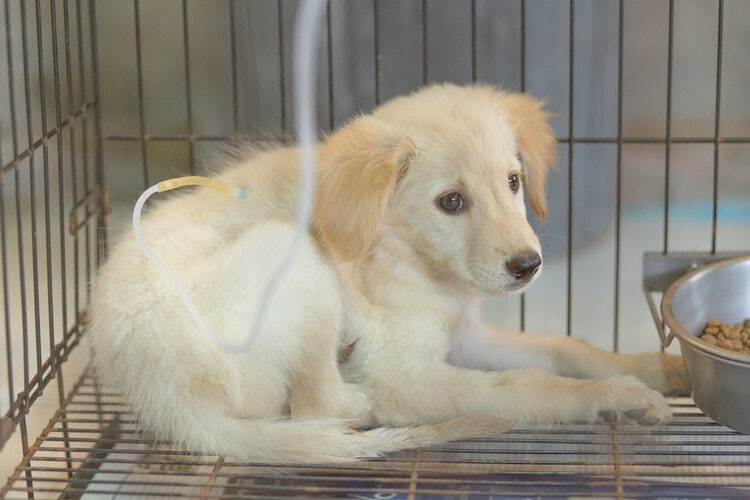
10. Medication
Certain medications can cause vomiting as a side effect. Some dogs might even vomit from tick-and-flea treatments or antibiotics. If you believe that your dog might be ill from its medicine, speak to your vet. They can prescribe a different kind of medication that hopefully won’t make your dog sick.

Summary
Most of the time, if your dog is vomiting in the morning, it is a sign that needs attention but can be remedied. If the vomit is due to the dog only eating once a day, the best solution is to give your dog at least two meals throughout the day.
The longer your dog goes without food in its tummy, the more likely you’ll find a puddle of bile on the floor. You can certainly get your dog used to fasting windows, and this is a healthy habit, but they should receive at least two meals a day. However, if your dog is vomiting in the morning and has other symptoms, like a loss of appetite, no energy, and diarrhea (particularly if there’s blood in it), take your pup to the vet immediately.
Morning vomit is usually nothing to worry about, but keep an eye on your pup and note any other signs. Your dog’s health is the most important thing.
See also:
- Why Does My Dog Throw Up When I Leave the House
- Why Is My Dog Foaming at the Mouth: 8 Common Reasons (Vet Answer)
Featured Image Credit: JumpStory

